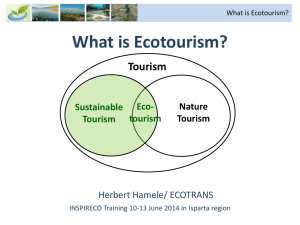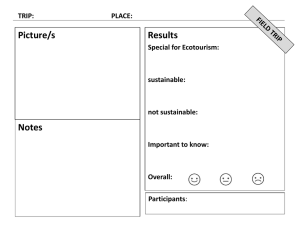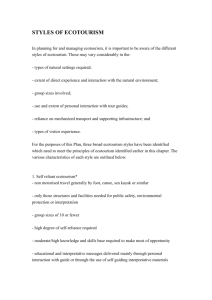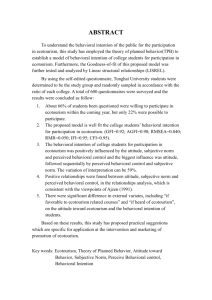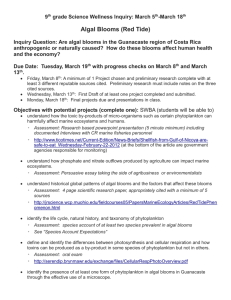Problem Solution essay Final version
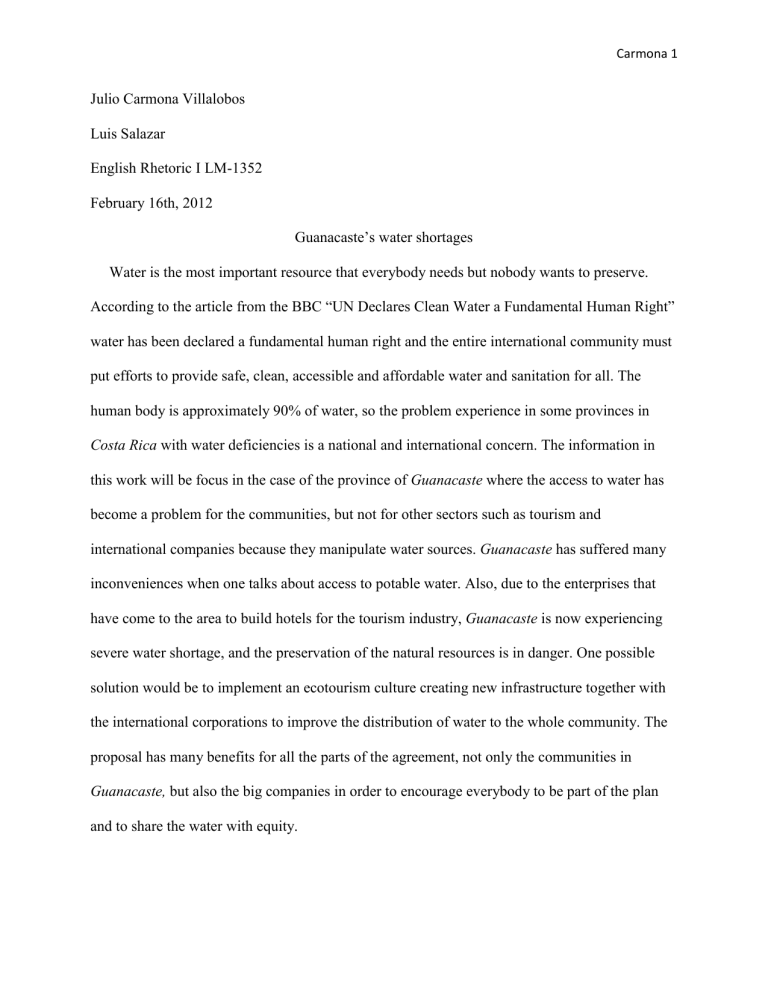
Carmona 1
Julio Carmona Villalobos
Luis Salazar
English Rhetoric I LM-1352
February 16th, 2012
Guanacaste’s water shortages
Water is the most important resource that everybody needs but nobody wants to preserve.
According to the article from the BBC “UN Declares Clean Water a Fundamental Human Right” water has been declared a fundamental human right and the entire international community must put efforts to provide safe, clean, accessible and affordable water and sanitation for all. The human body is approximately 90% of water, so the problem experience in some provinces in
Costa Rica with water deficiencies is a national and international concern. The information in this work will be focus in the case of the province of Guanacaste where the access to water has become a problem for the communities, but not for other sectors such as tourism and international companies because they manipulate water sources. Guanacaste has suffered many inconveniences when one talks about access to potable water. Also, due to the enterprises that have come to the area to build hotels for the tourism industry, Guanacaste is now experiencing severe water shortage, and the preservation of the natural resources is in danger. One possible solution would be to implement an ecotourism culture creating new infrastructure together with the international corporations to improve the distribution of water to the whole community. The proposal has many benefits for all the parts of the agreement, not only the communities in
Guanacaste, but also the big companies in order to encourage everybody to be part of the plan and to share the water with equity.
Carmona 2
Guanacaste province is recognize as one of the most rich in natural resources, but the lack of organization and the disinterested treatment and distribution of water in the area has brought severe problems to the province. The creation of expensive hotels with more than 5 pools and golf camps appears to be the best option to bring tourists to Guanacaste, but the communities in the area do not see the benefits of the business. Nevertheless, this trend is affecting the zone because the amount of water use to fill and maintain the hotels is huge, so most of the times the companies alter the course of water that should be use equally by the community and the hotels.
In addition, the hotels use the water to waste it in those activities while the people from the area have to struggle to get water. One example of these problems is the well-known case of Sardinal .
As stated by the U.C.R in the study “Informe Final: Implicaciones del proyecto de Ampliación del Acueducto el Coco-Ocotal, Guanacaste, Conocido ‘como Sardinal’”, the problem begins when some companies gathered with the intention of enlarge the aqueduct in the area of El Coco-
Ocotal in the district of Carrillo province of Guanacaste (12-14). The problem with this project is that the national and international institutions were investing in it, but there was no organization of the results of such project, or information about the benefits that this could bring to the zone of Carrillo . In addition, the organizations that were supporting the activity had unknown interests, and the U.C.R in its study reveals a lot of irregularities (12-14). Furthermore, this is just an example of many cases that had happened before, and one can see the lack of organization that has led the province to the status that it has right now. In the article written by
Keyvon Ross “The Development of Guanacaste Costa Rica: Policy Recommendations”, he states that the tourist consumes 10-15 times the amount of water than people in rural areas, and in most zones the water production capacity is very close to the current demand, so this situation increases the risk of deficit of the hydric resource (16). The problem in Guanacaste has risen
Carmona 3 every year, and it will not get resolve by itself; unfortunately, nobody has put into practice a real procedure to solve the water shortage in the region.
The problem is serious, so the solution has to be really feasible and solid to bring the equity to the communities in Guanacaste . The proposal consists in the implementation of the ecotourism and private sector’s funding integrating also the local governments as regulator of the projects. In the same article written by Keyvon Ross, the proposal is explain as the implementation of the
PPPS (public-private-partnerships). The private sector could make more contributions increasing the tax collection in the areas that they operate (22), or they could also donate money because that kind of contributions will count as the taxes that they have to pay at the end of every year.
The big companies will be helping in this way to the welfare of the area, and this will bring a lot of tourist. Also, the region should go back to the application of the ecotourism expanding the blue flag program and the CST (Certification for Sustainable Tourism Program) should be used in the construction of new infrastructure. In addition, Keyvon Ross mentions in his article that the environmental education is very important to success in the improvement of the preservation of water resources to have more availability of water for everybody (26). The idea is really well structure and the studies about it demonstrate that if people from Guanacaste want to have enough water for everybody they can have it, but many persons will have to work together to achieve the objective. The ecotourism project is a really good option because it is a good opportunity for people that come to the country with the idea, not only of enjoy the landscape, but also of having a new experience doing something new and helpful for the preservation of the area. In addition, one knows that many tourists nowadays are looking for the opportunity of do something different, and this new trend is a really good choice for those travelers that want to
Carmona 4 help. One has to remember that in most cases people want to run away from the routine of an office, but it does not mean that they have a lack of energy to work.
However, there is little opposition to the solution, but with a slight organization and monitoring from the authorities the proposal will not have any problem to be a success. In
Keyvon Ross’s article, he says that the ecotourism could put the wildlife of the country in danger and expose to be exploited for economic gain because the travelers in most cases are not qualifying for ecotourism activities. Additionally, the national parks are under pressure due to the unregulated amount of visitors (10). People criticize the solution instead of propose ideas to overcome the troubles that normally will appear when a problem is been fixed. The first critic is about the exploited wildlife but it is easy to solve. The institutions in charge of the regulation of the ecotourism programs could share forms asking for personal and psychological information from the person that is volunteering to this kind of plans. The idea will let the people from the zone know what kind of persons are coming to the country, and to say “yes” or “no” to the individuals that could represent some danger to the wildlife. The local governments could help in the organization for the lists of travelers coming to the country, and the investment of the private sector could be useful to release the pressure that the parks have. In addition, the institutions could prepare travelers using educational programs about the correct technics to perform proper ecotourism activities. If people attempt to have a good organization and proper investment of the resources the proposal will be really feasible.
The problem of water shortage is affecting the province of Guanacaste since many years ago, and people from the area do not have support from authorities. Now it is time to help the communities in this region because it is not only a benefit for them, but also it is a benefit for the entire country. The implementation of the proposal about the ecotourism, the private sector’s
Carmona 5 funding, and the participation of the local governments to regulate the activities is fundamental to success. Finally, one has to realize that everyone is part of the solution, and helping the people from the area of Guanacaste and other provinces with problems similar to this will bring a lot of benefits, not only for the country, but also for the future generations.
Carmona 6
Works Cited
U.C.R. Informe Final: Implicaciones del proyecto de Ampliación del Acueducto el Coco-Ocotal,
Guanacaste, Conocido “Como Sardinal”. 2009. PDF file.
“UN Declare Clean Water a ‘Fundamental Human Right’”
. BBC Mobile. BBC 28 July 2010.
Web. 09 Feb. 2012.
Ross, Keyvon. The Development of Guanacaste Costa Rica: Policy Recommendations.
2010. PDF file.
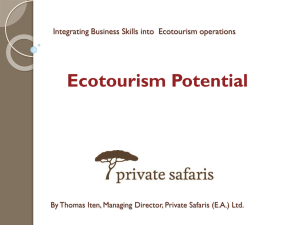
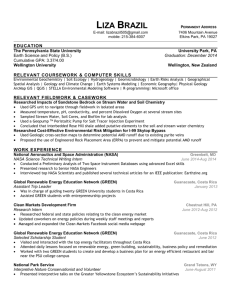
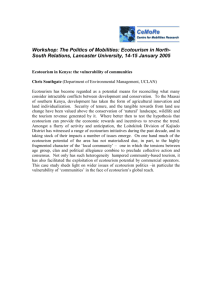
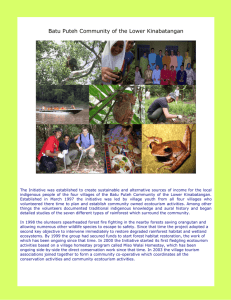
![Ecotourism_revision[1]](http://s2.studylib.net/store/data/005398532_1-116d224f2d342440647524cbb34c0a0a-300x300.png)
